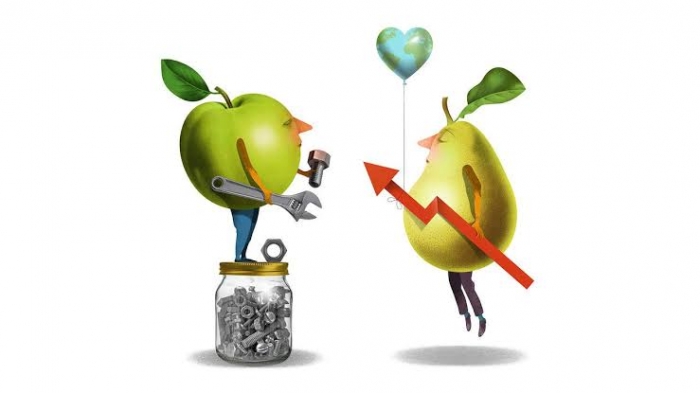How to build businesses that last
America is not just the land of red-blooded capitalism. It has an esoteric tradition of capitalist altruism, too. Take Trader Joe’s, an own-label grocery chain like m&s in Britain. It somehow retains a local-community feel, like an indoor farmers’ market with good prices and wonderful staff, despite having 549 stores. Whole Foods Market, a 530-store Mecca for well-heeled health nuts and epicureans, has a similar vibe. Or at least it did until 2017, when it was sold to Amazon for $13.7bn. Its co-founder, John Mackey, has recently published a book full of joie de vivre about his 42 years at its helm. “The Whole Story: Adventures in Love, Life and Capitalism” comes a few years after an even quirkier memoir by the founder of Trader Joe’s, the late Joe Coulombe. They are strikingly different characters who approached retailing in unusual ways. Each offers good lessons in entrepreneurship.
Mr Mackey’s book starts with him as a college dropout having an lsd-fuelled epiphany: “I was IT. And it was me, and I was there. And it was ALL.” Don’t be put off. Whether or not would-be entrepreneurs should drop acid for inspiration, in his case it worked. The Texan’s quest for self-discovery leads to a new philosophy of natural-food retailing that conquers America. Coulombe’s book, “Becoming Trader Joe”, has no New Ageiness, even though his chain started in California in 1967. As a lesson in how to beat the big guys in business, it does exactly what it says on the tin. His first anecdote is about the merits of relabelling Peruvian tuna as pilchards to avoid import quotas and cut prices.
Such contrasts are telling. Though Mr Mackey is a proud capitalist, he seeks to make Whole Foods a “values-based” company that puts the interests of customers, suppliers, staff and the environment alongside those of shareholders. He becomes an advocate for “stakeholderism”, though is refreshingly candid about the difficult trade-offs involved. Coulombe put Trader Joe’s success down to more nuts-and-bolts factors: well-paid employees; cheap, interesting produce; an encyclopedic understanding of retail regulations (and how to get around them). Given the struggles that pepper Mr Mackey’s book, from internal coup attempts and vulture investors to customer boycotts, Trader Joe’s more down-to-earth approach looks, to say the least, less exhausting.
The two firms do share similarities. Both have been celebrated as good places to work while being staunchly anti-union. Coulombe wrote that his core value from the start was high compensation, which he says boosted productivity so much it was worth it. “You can’t afford to have cheap employees.” Mr Mackey says pay was of secondary importance, but that Whole Foods’ sense of mission and community attracted workers. Both founders had a nose for changing customer tastes. In the 1960s Coulombe realised that Americans were becoming better educated and travelling more, which made them keen to explore new tastes. Early items he sold were wine, which offered a guaranteed profit thanks to price controls, and Brie, on which Wisconsin’s cheese lobby had neglected to demand import restrictions. Mr Mackey bet boldly on his hunch that even young Texans would crave healthier foods. Later, after a proselytising lecture he heard on olive oil, he was quick to see the potential in foodies as well as hippies.
Both men, for all their community values, had a shrewd eye for the bottom line. Coulombe’s business epiphany came when he centralised the stores’ buying and delivery activities, slashed the number of items available, put most of them under the Trader Joe’s brand, and sought a gross profit on every one (“No ‘loss leaders’,” he wrote). Whole Foods had a less centralised approach. But it kept tight control of administrative expenses, and reinvested profits in the business. It was a master at making the stores that it acquired quickly profitable, enabling further expansion.
As father figures of their firms, their differences are more obvious. “I’m going to disillusion those dear souls—there seem to be a lot of them out there—who think that Trader Joe’s sprang, fully developed, from my brain, like Athena from the head of Zeus,” Coulombe wrote. He was not one to dwell upon himself. Mr Mackey, in contrast, puts himself and his personal life (including paramours) at the centre of the Whole Foods story. Likewise, they built their companies in different ways. Coulombe said that in order to survive, Trader Joe’s had to be regularly reinvented from the bottom up. Mr Mackey, to begin with, treats Whole Foods as his baby. As it expands, he accepts that it should become more independent of him. But there is not enough reinvention.
Stakeholder in the heart
For all Mr Mackey’s faith in “conscious capitalism”, Whole Foods developed a problem in the wake of the global financial crisis of 2007-09, when its pricey fare earned it the moniker “Whole Paycheque”. It stuck. He admits in the book that the firm’s inability to cut prices, partly because of a fixation on high margins, was a big strategic error. That was never a problem for Trader Joe’s, which still prides itself on offering value for (not much) money.
The fallout for Whole Foods was momentous. First came accusations from regulators in California and New York City that it was overcharging customers on pre-packed food. These led to a fine and a settlement. Then shareholder activists tried to oust Mr Mackey. In response, he sold the company to Amazon, which swiftly cut prices and raised hourly pay. He writes that he regrets the circumstances that led to the sale more than the sale itself. But he gives the impression that Whole Foods quickly lost its individuality. Frustrated, he quit in 2022. Coulombe had regrets, too. In 1979 he sold out to the Albrecht family, co-founders of Aldi, a German discount retailer, though he stayed on as boss for nine years. He died in 2020, wishing he hadn’t sold. Like Mr Mackey, he built his business to last, not for the quick buck.
The Economist


































































